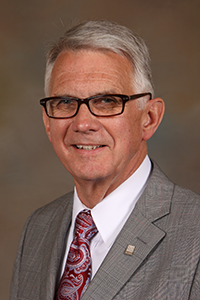
Civil engineering alumnus Mike Conzett (BSCE’76, MSCE’78) brings more than 35 years of experience to lead the nation’s top group for engineering licensure.
Conzett was elected president-elect of the National Council of Examiners for Engineering and Surveying (NCEES) at the NCEES 2014 Annual Meeting in August. He has been actively involved in NCEES since 2004, serving most recently as Central Zone Vice President in addition to participating in several committees for professional engineering examination, education, legislative guidelines, and more. “I want to ensure engineering is recognized more as a highly valued profession in service to the public and less as a commodity that is purchased,” Conzett said.
Conzett compares the engineering licensure model to a three-legged stool. One leg comprises formal engineering education, which educates and forms engineers as professionals. Another component promotes the progressive experience engineers gain as they pursue licensure. Education and experience are then tested in the third component – formal examination. NCEES provides this in the form of the Fundamentals of Engineering (FE), Fundamentals of Surveying (FS), Professional Engineering (PE), Structural Engineering (SE), and Professional Surveying (PS) exams.
One of Conzett’s goals as president-elect is to help lead the development of the PE exam in a computer-based format. Such a format could offer questions that better test relevant and practical knowledge using videos and other real-life scenarios that mimic engineering situations.
Faculty and staff of the Iowa State University Department of Civil, Construction and Environmental Engineering encourage students to take the FE exam, which is the first step in the process leading to the PE license. Iowa State’s FE exam passing rate has surpassed the national average by at least 10 percentage points for the past 10 years.
Once students graduate, they’re required to gain practical engineering experience before sitting for the PE exam and ultimately obtaining their PE license. The license is evidence that an individual is competent to practice engineering where public health, safety and welfare is of prime importance.
Iowa State PE-licensed professors persuaded Conzett as a student to pursue engineering licensure. He recognized that professors such as Dr. Bob Baumann and Dr. Jack Cleasby conducted consultant work in addition to teaching and research. “In my mind, they were setting a great example for me and others to make a professional engineering licensure part of a successful and rewarding career,” Conzett said.
In January 2014, Conzett retired from HDR, Inc., as vice president and senior project manager. He had worked for HDR, Inc., since 1984. Prior to that he was an engineer at Procter & Gamble in Cincinnati, Ohio, which was his first job upon receiving his master’s degree in 1978.